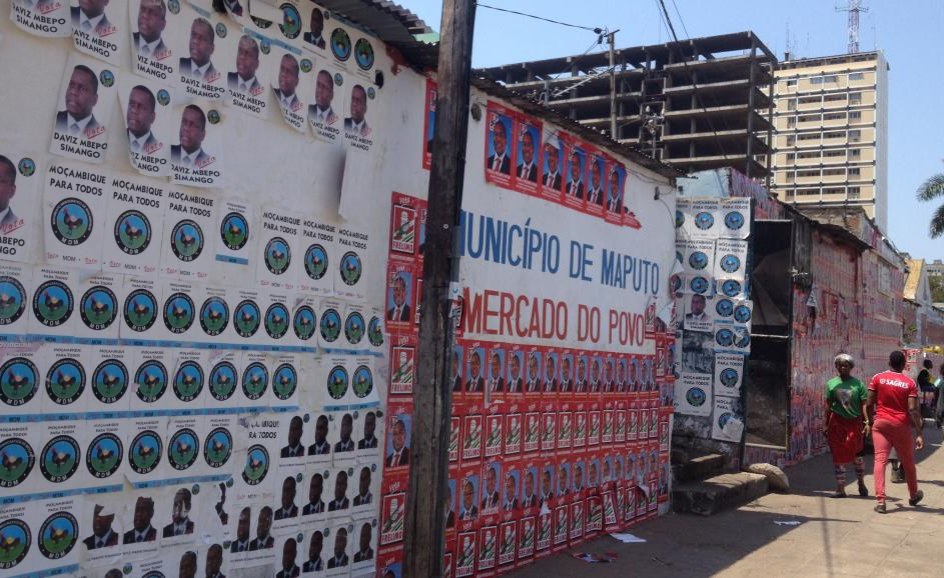Frelimo wins total control, Renamo smashed, Podemos new official opposition
The CNE will announce the official national results this afternoon at 14.30 local time. The results were prepared by STAE based on provincial results, and are largely unchanged from the numbers we have been reporting here based on the provincial results sheets (editais).
In the national parliament, Frelimo gains 11 seats to give it 195, which is more than three quarters of the seats, and gives Frelimo unilateral power to change the constitution. Renamo lost two-thirds of its seat in parliament, falling from 60 to 20. It loses its place as second largest party in parliament. This will be a major financial blow to Renamo, because the second party receives a large amount of money from the state, and usually takes a cut of deputies parliamentary salary.
Podemos because the second party in parliament, with 31 seats. MDM falls from 6 to 4 seats.
Renamo’s Ossufo Momade’s vote fell from 1,356,644 five years ago to 403,591 this year, behind the 1,412,511 for Venancio Mondlane. As the second most voted presidential candidate, Mondlane replaces Momade on the Council of State
The CNE meeting yesterday was open to party agents and observers and lasted more than seven hours. Although it was called the apuramento (tabulation) and by law is open, in fact the meeting is just the CNE receiving from STAE the results it has compiled, which is done in secret and cannot be watched by parties, observers, or press. But the meeting yesterday was much more open than the one give years ago. Nevertheless, lack of transparency remains the norm.
—————
CNE rejects EU demand for polling station results sheets
Demands by the EU, political parties, lawyers and civil society that polling station results sheets (editais) be made public in an organised way has been rejected by the National Elections Commission (CNE). Their justification is that the law (Lei no 15/2024 de 23 de Agosto, art 119) says that the CNE count is done on the basis of district and provincial editais and therefore polling stations editais are outside their mandate. But the law (Lei no 15/2024 de 23 de Agosto, Secção II) also requires that the information from polling station editaisbe sent to the CNE. Indeed, most district editais already contain this information. So STAE and the CNE could compile and publish the results of polling stations, as they did in the past.
—————
Invalid votes were never checked
The law required that invalid voles (nulos) must be checked at higher level, for two reasons. First, polling station staff are often too strict in excluding a vote, even when the intention of the voter is clear. Second, an important means of fraud is to take valid votes for the opposition and simply put them in the invalid pile during the count. In both cases, the opposition normally loses votes. Thus the requirement for checking (“requalification”) of nulos.
This was first done by the CNE at national level then moved down to district and provincial level. The recently changed law moved it back to national level (Lei no 15/2024 de 23 de Agosto, art 120). It appears the CNE did not notice the change and did not check the nulos, but districts were told they no longer had this responsibility.
—————
Tug of war continues:
Constitutional Council asks the Supreme Court to send it Venancio Mondlane’s cases
District courts are the first tier of the electoral court system (under the Constitutional Council) but also criminal courts (under the Supreme Court), TS , which has led to an ongoing power struggle. The problem is that electoral offences, under the CC, are often criminal actions, under the TS In August the TS told district counts they must inform the office of the attorney general of an criminal offenses..

Sign up for free AllAfrica Newsletters
Get the latest in African news delivered straight to your inbox
The CC responded Tuesday (22 October) with a letter to the TS asking it to instruct all the provincial and district courts to remit to the CC all the election dispute appeals requested by Venancio Mondlane and analysed and judged by those same courts.
The Constitutional Council justifies this request with the need to analyse, as the court of final instance, the appeals and claims, and then validate and proclaim the results of the general elections The Council also asks the Supreme Court to notify it in the event that there are no cases in the provincial and district courts.
If the Constitutional Council is resorting to the Supreme Court, this means that the courts have not sent it the cases. This is a signal that the conflict between the Council and the courts is far from over.
Source : AllAfrica


